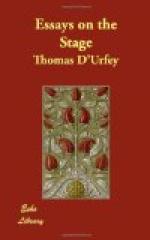after Ages, as much as we know the other has in the
former: But every one is Fool or Knave that is
not of this Gentlemans kidney. A little while
after, at the usual rate of his own accustom’d
civility, he falls upon the Renown’d Shakespear,
and says, he is so guilty, that he is not fit to make
an Evidence. [Footnote: Collier, p. 50.] Why
now it ’twere possible for his Complexion to
blush, there’s ne’re a Robe of any Friend
Cardinal the Absolver has at Rome, that can
be redder than his would be for such a Position:
Nor does it end here, but is mixt with some more foolish
and insolent Remarks in another place, upon the admirable
Tragedy of Hamlet. And here he has no
other way to shew his malice, but by ridiculously quibbling
upon the prettiest Character in it, the innocent young
Virgin Ophelia, who, because the Poet makes
her run mad for the death of her Father, and loss
of her Lover, and consequently makes her sing and speak
some idle extravagant things, as on such an occasion
is natural, and at last drown her self, he very masterly
tells us, the Poet, since he was resolv’d
to drown her like a Kitten, should have set her a
swimming a little sooner; to keep her alive, only
to sully her Reputation, is very cruel. [Footnote:
Collier, p. 10.] Yes, but I would fain ask Doctor Absolution
in what she has sullied her Reputation, I am sure five
hundred Audiences that have view’d her could
never find it out, tho he has; but the Absolver can’t
help being positive and partial to his own humour,
tho he were to be hang’d, as the Lady was drown’d,
for he is very angry in another place with the aforesaid
Author, for making Sir Hugh Evens in the Merry
Wives of Windsor, a silly, eating, chattering Welch
Priest, but vindicates and speaks well, of Sir John,
Parson of Wrotham, in the History of Sir John
Oldcastle; [Footnote: Collier, p. 125.] tho
he swears, games, wenches, pads, tilts and drinks,
and does things which our Reformers Guts are ready
to come up at another time, only, forsooth, because
he is stout; but ’tis indeed only because
he is a Parson, and sullen, which he thinks wise,
for he cannot endure that Copyhold should be touch’d,
as you may see more plainly a little further, where
he says in Loves Labour Lost, the Curate plays
the fool egregiously; and so does the Poet too:
there he clenches the Nail, there he gives Shakespear
a bold stroke, there obstinacy and malice appear in
true colours: And yet if a parcel of the ones
Plays, were set up by way of Auction against t’others
Sermons and Essays; nay, tho the Loyal and
Politick Desertion discussd was thrown in to
boot, I know not what the Grave would do, but I am
sure the Wise would quickly find difference.
And yet to Remark him nicely, this humour of railing
is only where the Poets do not suit with his design;
for in another place you’ll find this same Shakespear,
that was before too guilty to make an Evidence, a




